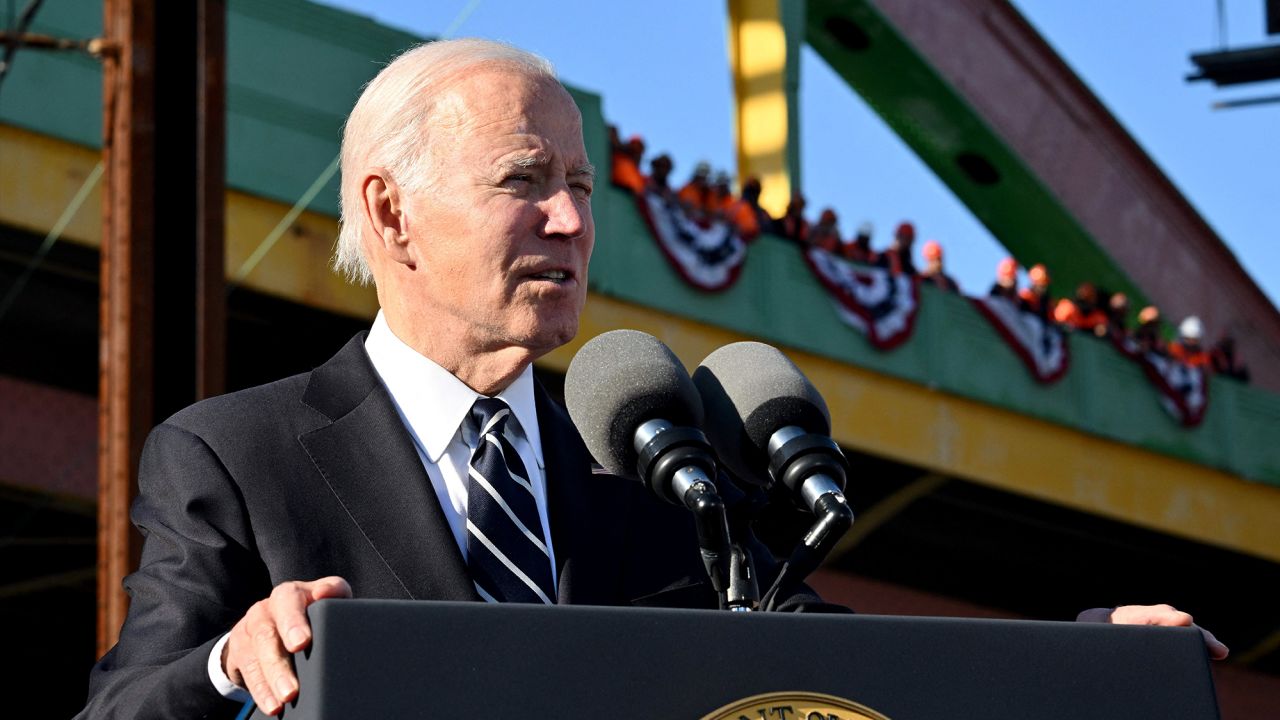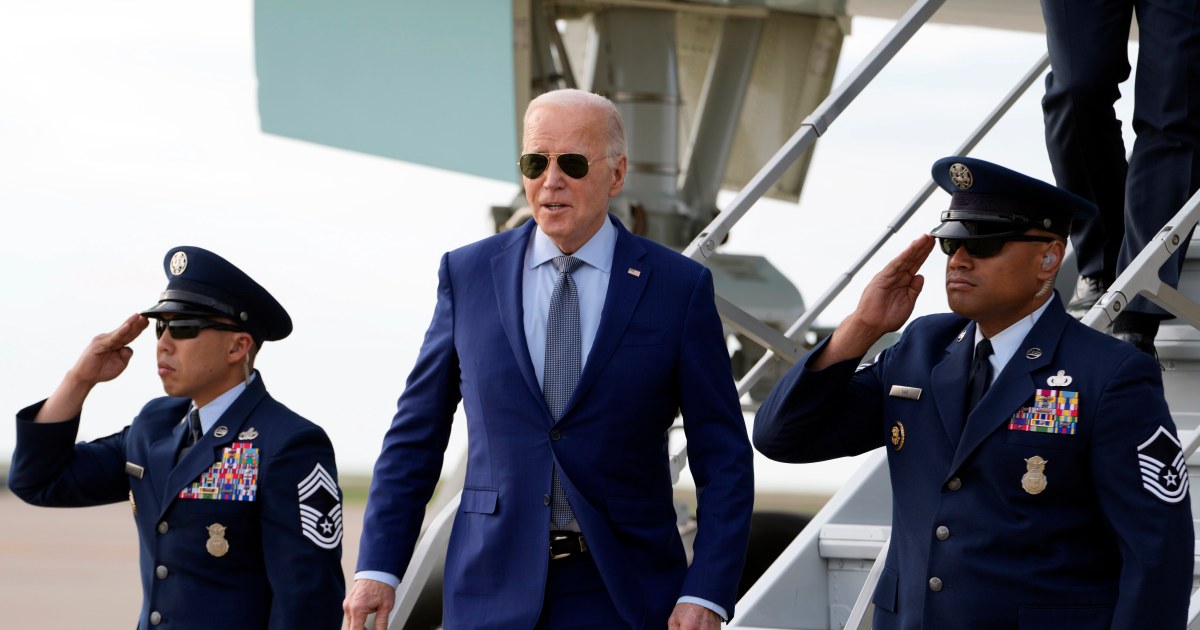The WHO maintains the covid-19 pandemic as an emergency 0:49
(CNN) --
President Joe Biden plans to end national and public health emergencies for covid-19 on May 11, the White House reported Monday.
That means many Americans would have to start paying for COVID-19 testing and treatment when the measures end.
The White House, in an administration policy statement opposing two House Republican bills to end emergencies, said the two orders declared in response to the pandemic would each last be extended until May 11.
Biden plans to end the national covid-19 and public health emergency on May 11
"This decision would align with previous commitments by the administration to give at least 60 days notice before the end of the (public health emergency)," the statement said.
The benefits allowed by emergencies will disappear
The public health emergency has allowed the government to provide free COVID-19 tests, treatments and vaccines to many Americans, as well as offer increased social safety net benefits, to help the nation cope with the pandemic. and minimize its impact.
"People are going to have to start paying some money for things they didn't have to pay for during the emergency," said Jen Kates, a senior vice president at the Kaiser Family Foundation.
"That's the main thing that people will start to notice."
Most Americans covered by Medicare, Medicaid, and private insurance plans have been able to get Covid-19 tests and vaccines at no cost during the pandemic.
People with Medicare and private insurance have been able to get up to eight home tests a month from retailers at no cost.
advertising
Medicaid also covers the cost of home testing, although coverage may vary by state.
Medicare and Medicaid beneficiaries have also received full coverage for certain therapeutic treatments, such as monoclonal antibodies.
After the emergency is over, Medicare beneficiaries will generally have to pay for home tests and all treatments.
However, immunizations will continue to be covered at no cost, as will tests ordered by a healthcare professional.
State Medicaid programs will have to continue to cover free doctor-ordered COVID-19 tests and immunizations.
But members may have to pay for treatments out of pocket.
Those with private insurance may have to pay for lab tests, even if ordered by a provider.
Vaccines will continue to be free for privately insured using network providers, but out-of-network providers may incur a cost.
Covid-19 vaccines will be free to those with insurance, even after the public health emergency ends, due to several federal laws, including the Affordable Care Act, also known as Obamacare, and the measures of the pandemic era, the Inflation Reduction Act, and a relief package for 2020.
The WHO affirms that covid-19 remains a global health emergency, but the pandemic is at a "transition point"
Americans with private insurance have not been charged for monoclonal antibody treatment since the federal government prepaid for them.
However, patients may be charged for the office visit or administration of treatment.
But that's not tied to the public health emergency, and the free treatments will be available until the federal supply runs out.
The government has already exhausted some of the treatments, so private policyholders may already be picking up some of the cost.
The uninsured had access to free tests, treatment and vaccines through another pandemic relief program.
However, federal funding dried up in the spring of 2022, making it difficult for people without coverage to get free services.
The federal government has been preparing to shift Covid-19 care to the commercial market since last year, in part because Congress failed to authorize additional funding to buy additional vaccines, treatments and tests.
Pfizer and Moderna have already announced that commercial prices for their Covid-19 vaccines will likely be between $82 and $130 per dose, about three to four times what the federal government paid, according to Kaiser.
Medicare provisions
The public health emergency has also brought additional funding to hospitals, which have received a 20% increase in the Medicare payment rate for treating covid-19 patients.
In addition, Medicare Advantage plans have been required to bill members affected by the emergency who receive care at out-of-network facilities the same as if they were at network facilities.
This will end once the public health emergency expires.
less impact
But several of the most significant improvements to public assistance programs in the face of a pandemic are no longer tied to the public health emergency.
Congress cut the connection in December as part of its government funding package for fiscal year 2023.
In particular, beginning April 1, states will be able to begin processing Medicaid eligibility assessments and disenrolling residents who no longer qualify.
They will have 14 months to review the eligibility of their beneficiaries.
As part of a covid-19 relief package approved in March 2020, states were prohibited from kicking people out of Medicaid during the public health emergency in exchange for additional federal matching funds.
Since then, the number of Medicaid enrollees has skyrocketed to a record 90 million people, and millions are expected to lose coverage once states start selecting recipients.
According to an analysis published in August by the Department of Health and Human Services (HHS), some 15 million people could be excluded from Medicaid when the continuous enrollment requirement ends.
About 8.2 million people would no longer qualify, but 6.8 million people would be disenrolled even if they remained eligible, according to department estimates.
However, many who disenroll from Medicaid may choose other coverage.
Food stamp recipients have gotten a boost during the public health emergency.
Congress increased food stamp benefits to the maximum for your family size in a 2020 pandemic relief package.
The Biden administration expanded the push in spring 2021 so that households already receiving the maximum amount and those receiving only a small monthly benefit would receive a supplement of at least $95 a month.
This extra help will end in March, although several states have already stopped providing it.
However, Congress expanded a number of pandemic flexibilities as part of the government's funding package.
More Medicare enrollees will be able to receive care through telehealth during a public health emergency.
The service is no longer limited to just those who live in rural areas.
They can perform the telehealth consultation at home instead of having to travel to a health center.
In addition, beneficiaries can use smartphones and receive a broader range of services through telehealth.
These measures will continue until 2024.
Impact on the FDA
The US Food and Drug Administration (FDA) reported Tuesday that, when the Biden administration ends the emergency, existing emergency use authorizations for vaccines, tests or treatments against COVID-19 will not be affected, and the agency will be able to continue issuing emergency use authorizations.
"It is important to note that the termination of the public health emergency declared by HHS under the Public Health Services Act will not affect the FDA's ability to authorize devices (including tests), treatments, or vaccines for emergency use. Existing emergency use authorizations (EUAs) for products will remain in effect and the agency may continue to issue new EUAs in the future when the criteria for their issuance are met," the agency said in a statement to CNN.
Since the start of the COVID-19 public health emergency, it "has enabled the FDA to provide important tools and flexibilities to manufacturers, healthcare facilities, providers, patients, and other interested parties," according to the statement.
In addition to the public health emergency, HHS has issued two other emergency declarations that provide broader access to COVID-19 medical measures.
For example, emergency use authorizations for tests, treatments, and vaccines are not tied to the public health emergency, but HHS will have to determine when to end the declaration allowing their use.
Many tests are available to the public under emergency use authorization, although the FDA has granted several permanent marketing authorizations.
Some therapies, such as remdesivir, have been approved to treat covid-19, although others remain available under emergency use authorization.
Paxlovid and other oral antiviral drugs available under emergency use authorization will continue to be covered by Medicare even though it has not yet been fully approved by the FDA, thanks to a provision Congress implemented as part of the government's spending package for the fiscal year 2023 that was approved in December.
Medicare does not typically cover treatments available under emergency use authorization, but has done so during the pandemic as part of a public health emergency.
Vaccines developed by Pfizer/BioNTech, Moderna and Johnson & Johnson, and Novavax were also initially made available through emergency use authorization, though some have since been fully approved by the FDA for certain ages.
HHS also issued another statement that provides immunity from liability to pharmacists who administer COVID-19 vaccines to children and to healthcare professionals who vaccinate people in states outside of the state in which they are licensed.
The term expires in October 2024.
White House response
The White House intervened because House Democrats were concerned about voting against Republican legislation to end the public health emergency that is due to be introduced this week without a plan from the Biden administration, a senior official said. Democratic adviser to CNN.
"Democrats were concerned about the optics of voting against Republicans to end the public health emergency, in the absence of an understanding of if and how we intended to do so from the White House," the adviser said.
"As soon as we saw this bill, obviously it concerned the White House. So it was important that they speak out."
The administration maintains that the bills are unnecessary because it intends to end emergencies anyway.
And he pointed out that the continuation of the statements until mid-May does not entail any restriction.
"To be clear, the continuation of these emergency declarations through May 11 does not impose any restrictions whatsoever on individual conduct with respect to COVID-19," the White House statement said.
"They do not impose mask or vaccine mandates. They do not restrict the operation of schools or businesses. They do not require the use of any medicine or test in response to covid-19 cases."
The White House said it would extend the COVID-19 emergencies one last time to ensure an orderly reduction of key authorities that states, health care providers and patients have relied on throughout the pandemic.
A White House official pointed to the success of the vaccination campaign and the reduction in covid cases, hospitalizations and deaths as justification for lifting the emergency declarations.
The official said a final extension will allow for a smooth transition for healthcare providers and patients, noting that healthcare facilities have already begun preparing for that transition.
The administration is actively reviewing the flexible policies that were authorized under the public health emergency to determine which ones may remain in effect after the May 11 lift.
The adviser told CNN that it will be up to each member to decide what is best for their district and how they will vote on the legislation this week.
The declaration of an end to the public health emergency will also end the border restriction known as Title 42, likely triggering a showdown on Capitol Hill.
-- CNN's Annie Grayer contributed to this report.
Covid-19





/cloudfront-eu-central-1.images.arcpublishing.com/prisa/OOLBKF5K4VFN7EA7IFFA4PMVUE.jpg)









